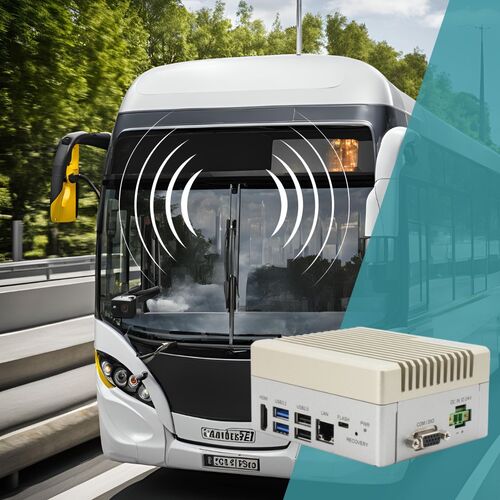Advanced Safety System Integration in Public Transport
Project Overview:
This case study explores the integration of an advanced safety system in public buses using the BOXER-8621AI from AAEON.
The system utilises data from cameras and sensors, processing it in real-time to enhance the safety of both passengers and pedestrians.

System Setup:
- Hardware: BOXER-8621AI, installed on the ceiling of the bus
- Driver Interface: TFT screen on the console for application management
- Camera Types: 3 types of cameras by P-Trade (Standard, CVBS, IR)
Key Features:
- Pedestrian and Cyclist Detection:
- The system continuously monitors the surroundings to identify pedestrians and cyclists, providing timely alerts to the driver.
- Real-time analysis of blind spots to prevent accidents, especially during lane changes.
- Alerts the driver about potential collisions with vehicles or objects ahead, allowing for preventive actions.
- Automatically applies brakes in emergency situations to avoid or mitigate collisions.
- Provides a clear view of the area behind the bus, enhancing safety during reversing manoeuvres.
- Warns the driver if the bus unintentionally drifts out of its lane.
- Helps the driver maintain a safe and appropriate speed by providing real-time speed limit information.
- Monitors the driver’s behaviour for signs of drowsiness or inattention, issuing alerts to ensure they remain focused.
Technical Specifications of BOXER-8621AI:
- Processor: NVIDIA® Jetson Orin Nano, 6-core Arm® Cortex®-A78AE ARMv8.2 64-bit
- Memory: 4GB LPDDR5
- USB Ports:
- USB 3.2 Gen 2 (Type-A) x 2
- USB 2.0 (Type-A) x 2
- Expansion Slots:
- M.2 3042/3052 B Key x 1 (4G/5G/M.2 2242 B+M Key storage)
- M.2 2230 E Key x 1 (WiFi/BT/Storage)
- SIM Slot: x 1
- Power Input: 12V~24V DC
- Software:
- JP 5.1.1 to 6.0
- Software disc encryption
- Clone tool to flash multiple systems at once
The implementation of the BOXER-8621AI in public buses significantly enhances safety by utilising advanced AI and sensor technologies. The comprehensive suite of features ensures that drivers are better equipped to handle various road situations, ultimately reducing the risk of accidents and improving the overall safety of public transport.




















